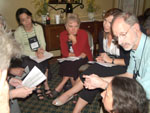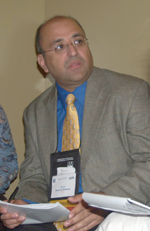Global group seeks better
communication
by Mary Helen
YarboroughPublic Relations
Improving communication between health care providers and patients will improve treatment, relationships and patient compliance; and reduce health care costs and misdiagnoses, according to participants in the annual International Conference on Communication in Healthcare (ICCH) Oct. 9-12.
 Dr. Lilless
Shilling, center, participates in a communication workshop attended by
an international group of health care providers.
Dr. Lilless
Shilling, center, participates in a communication workshop attended by
an international group of health care providers.About 370 ICCH members representing more than 30 countries and disciplines of health care, including veterinary care, attended the MUSC-sponsored event in Charleston with the goal of improving communication. Generally, these practitioners see enhanced communication with patients as an integral component of effective therapy. Improved communication between physicians and medical specialists also was seen as an area needing vast attention.
 Dr. Shakaib Rehman
during the conference.
Dr. Shakaib Rehman
during the conference.“What is the one procedure that every doctor will perform? Every doctor will interview a patient as many as 175,000 times in his career. That is the No. 1 procedure among doctors,” said Shakaib Rehman, M.D., ICCH conference chair and vice president of the American Academy on Communication Healthcare (AACH), associate professor of internal medicine at MUSC, and physician manager at the Ralph H. Johnson Veterans Affairs Center. “Communication is a very important part of practicing medicine, as well as other disciplines of health care. But some people are born with good bedside manners and, for others the question is whether they can learn it and develop it. We now know that you can teach, track and assess good communication. Now, it’s a science.”
Ideally, improving communication would reflect greater compassion and care for the patient.
Tamatha Psenka, M.D., runs the pre-op clinic at MUSC. The family medicine practitioner in the Department of Anesthesia said communication with patients and family is critical in patient care.
“We are trying to show that it is medically significant to show an empathetic response in communicating with patients,” Psenka said. “Clear communication is essential to patient-centered care. So, we are trying to identify health literacy issues and promote shared decision-making on care continuum with different providers.”
Still, communication curriculum in medical schools is inconsistent and inadequate, said Rehman, who once taught communication to third-and-fourth-year medical students at the VA.
“You can never achieve excellence, in whatever you do, without good communication skills,” Rehman said. “Yet, there is no formal mechanism for teaching communication. Faculty members from around the world are trying to learn how to best do this.”
Communication has a societal—even a socio-economic—impact, Rehman said.
Poor communication has been linked to wrong diagnoses, inconsistent standards of care, health disparities, and even lawsuits.
In the 1990s, reality hit when many health maintenance organizations (HMOs) emphasized keeping cost of delivering health care low over providing quality care. Many people suffered as a result and the HMO system was overhauled.
Meanwhile, the increased cost and liability for practitioners to provide care has resulted in an emergent technological revolution. Not everyone thinks that’s all good.
European medical professionals say that in America, poor patient-physician relations are blamed on an overreliance on technology.
“The charlatan in America will overinvestigate like mad [in treating a patient]; whereas the charlatan in the U.K. will do nothing, because he doesn’t get paid for doing anything more,” said Jonathan Silverman, M.D., associate clinical dean and director of Communication Studies at the University of Cambridge School of Medicine.
The European medical system often is touted as better than the American system, in part because it is “free,” provided by governments through taxation. Europeans also can ante up extra money for better care, just as Americans do, but there is no comparable medical insurance system in Europe that will cover that extra expense.
“The American system is more consumer-driven; not necessarily more patient-centered; in fact, on the contrary,” said Jozien Bensing, Ph.D., founder of the European Association for Communication in Health Care (EACH), the AACH sister organization; and director of the Netherlands Institute for Health Services Research. “In America, it is more technically oriented. In Europe, it is more focused on the doctor and patient than on all of the techniques.”
Despite the reliance on technology in America, physicians and other health care providers spend more time with patients than their counterparts in Europe, according to a Dutch study, Bensing said.
“Patients spent an average of 16 minutes with doctors in the U.S., and an average of 10 minutes with doctors in the Netherlands,” Bensing said. “In the U.S., it is more task-oriented and instrumental exploring. In Europe, doctors find that it is more effective to let patients talk. They sit back and listen, and reflect on emotional empathy. Still, our consultations were shorter.”
Bensing acknowledges she doesn’t know all about the American health care system. She was surprised to learn of the physician provider network system used by American insurance providers. It is similar to a system used in many European countries where ministers of health require patients to be a part of practitioner list before seeing that practitioner.
But Americans are proud of their technologies that often are developed with European counterparts. They admit that technology may be getting in the way of their professional, personal and hands-on skills.
“Provider/patient communication has been under challenge because of the push for productivity,” said William Branch, M.D., AACH president and director of General Internal Medicine at Emory University. “Now, there’s new interest to improve the quality of care through better communication.”
Better communication also would improve health education to patients and create better patient compliance and satisfaction, Branch explained.
“You won’t see the same patients coming back as often, because the problem was addressed the first time,” Branch said. “The practitioner can figure out whom to spend 20 minutes with, or five minutes with, to make a proper diagnosis and treatment plan. In my opinion, a good health care provider can accomplish more through skills, including better communication skills, without giving up a lot of productivity.”
For information, visit http://www.aachonline.com.
Friday, Oct. 19, 2007
Catalyst Online is published weekly,
updated
as needed and improved from time to time by the MUSC Office of Public
Relations
for the faculty, employees and students of the Medical University of
South
Carolina. Catalyst Online editor, Kim Draughn, can be reached at
792-4107
or by email, catalyst@musc.edu. Editorial copy can be submitted to
Catalyst
Online and to The Catalyst in print by fax, 792-6723, or by email to
catalyst@musc.edu. To place an ad in The Catalyst hardcopy, call Island
Publications at 849-1778, ext. 201.